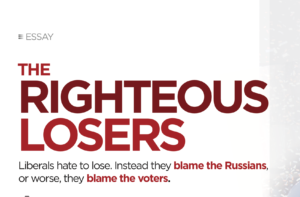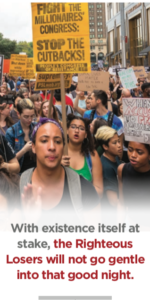The Righteous Losers
This article originally appeared in the Summer 2019 issue of Thinking Minnesota, now the second largest magazine in Minnesota. To receive a free trial issue send your name and address to [email protected].
 Another shocking election result. Another roomful of sobbing activists. It could have been the headquarters of the “Remain” campaign the night Britain voted to leave the European Union in June 2016. It could have been the Jacob K. Javits Convention Center the night Donald Trump defeated Hillary Clinton in the November 2016 presidential election. But this time it was Melbourne the night of the Labor Party’s (ALP) shocking defeat in Australia’s May 2019 general election.
Another shocking election result. Another roomful of sobbing activists. It could have been the headquarters of the “Remain” campaign the night Britain voted to leave the European Union in June 2016. It could have been the Jacob K. Javits Convention Center the night Donald Trump defeated Hillary Clinton in the November 2016 presidential election. But this time it was Melbourne the night of the Labor Party’s (ALP) shocking defeat in Australia’s May 2019 general election.
As with Brexit and Trump, Australia’s election results were unexpected. According to the Guardian, the conservative Liberal Party’s offer “boiled down to personal tax cuts, targeted at low- and middle-income earners in the short term, but offering an additional $230 billion of tax relief to higher income earners over the next decade… The plan would improve the household budgets of many families, but it would also make Australia’s tax system less progressive.” The party’s leader, Scott Morrison, had guy-next-door appeal and resisted plans to sharply cut carbon emissions.
By contrast, the ALP was offering “unashamedly progressive” tax policies, “with slightly more generous short-term tax cuts for low- and middle-income earners and a firm rejection of the Coalition’s bigger future cuts for workers higher up the income scales.” More importantly, it would meet “the rising clamor from the electorate” for more action to fight climate change with “a higher target for emissions reductions” and boosts for renewables, more electric cars, and strengthening of national environment laws. The ALP had been ahead in every opinion poll since mid-2016.
But the anticipated clamor hadn’t risen that high, and it was ALP leader Bill Shorten giving the concession speech. Brigid Delaney of the Guardian painted a bleak picture of that election night scene. “The woman checking my name off the list around 8pm is angry and crying and saying, ‘I don’t get it, we went in with policies, they went in with nothing.’” People openly sobbed when Shorten spoke. “No one is consoling anyone, because each person here seems to be in the middle of their own unique and terrible pain,” Delaney added. “Shorten says he did his best and tried his hardest—and someone shouts out from the crowd, ‘It’s not you Bill, it’s the country.’”
It’s not me, it’s you
Every election has a loser. Losing elections is an unavoidable part of democratic politics. Given this, democratic politicians should have methods in place to cope with loss. They can ask, “Were my policies wrong?” or “Was my campaign inept?” Supporters of Remain or Clinton in 2016 or the ALP may want to ask themselves similar questions.
In the early 1990s, both the Democrats in the United States and Britain’s Labour Party decided, after election defeats in 1988 and 1992 respectively, that they had to change tack, or at least make a good show of doing so, if they were ever going to win again. The cry from the floor as Michael Dukakis or Neil Kinnock conceded might have been, “It’s not the country, it’s you.”
This sort of self-examination concedes the possibility that you might be wrong. It has to. But what if you can’t concede that? If you are completely convinced that staying in the European Union is necessary, that Donald Trump is a fascist, or that only Bill Shorten can save Australia from being destroyed by climate change, you will struggle to even entertain the possibility that you might be wrong. If you were so certainly right, how did you end up a loser?
The Russians are coming! The Russians are coming!

Conspiracy theories have long been a favorite way of reconciling deeply held beliefs with an unaccommodating world. Hitler, unable to reconcile Germany’s strength and righteousness with defeat in the First World War, found an explanation in a supposed Jewish conspiracy.
The Righteous Losers of 2016 did something similar. Following Donald Trump’s election victory, the theory developed that it was a Russian plot. In a bid to destabilize the United States, Vladimir Putin had, we were told, decided to make the guy from The Apprentice president, and did this by hacking into Hillary Clinton’s emails, posting conspiracy theories about pedophile rings in pizza parlors on 4chan, and spending a few hundred dollars on Facebook ads.
This theory has been utterly demolished by the Mueller report, but the wonder is that anyone believed it in the first place. Indeed, if someone proposed this as a plan to swing a school board election, let alone a presidential election, your reply would be, “No chance.”
Britain’s Righteous Losers saw the hand of the Kremlin behind the Brexit vote. But look at North East England, a strongly pro-Brexit area. British Steel has about 5,000 employees there and is about to go into liquidation. The British government might consider bailing it out but is prevented from doing so by EU rules. Yet, Remainers believe that it isn’t restrictive rules, nor the EU’s destruction of the region’s fishing industry, which drove the Brexit vote. This would be to admit that their opponents have a case.
Instead, they blame a few dozen Russian bots on social media. After Hillary Clinton said, “We’re going to put a lot of coal miners and coal companies out of business,” you didn’t need to conjure up a new Red Scare to see why she lost West Virginia and Pennsylvania. But then, when Star Trek actor turned Twitter activist George Takei was accused of sexual assault, he claimed that this, too, was part of a Russian attempt to subvert American democracy. No doubt, someone in Australia is currently blaming the Kremlin for Bill Shorten’s defeat. Joe McCarthy was never this fevered.
The classes against the masses
The Righteous Losers have a second option: blame the voters. Shortly after the 2016 presidential election, President Obama allegedly mused, “Sometimes I wonder whether I was 10 or 20 years too early.” In other words, “It’s not me, it’s the country.” 
The Righteous Losers frequently express their distaste for their fellow citizens in more robust terms than those of President Obama. Following the votes of 2016 in Britain and the U.S. and, now, in Australia, there has been an outpouring of vitriolic hatred from the Righteous Losers at the voters who spurned them. In Britain, we have the nauseating spectacle of Remainers celebrating the deaths of elderly Leave voters. In the U.S., wearing a MAGA hat can get you punched. Indeed, when anyone to the right of Corey Booker is considered a Nazi, “It’s okay to punch a Nazi” gives you a very broad remit for political violence. And this from the people who tout their compassion most loudly and tell you that “Love Trumps Hate.” Their views might more accurately be summed up as, “A smack in the mouth Trumps Debate.” As Eric Hoffer wrote in his classic The True Believer, “Even when men league themselves mightily together to promote tolerance and peace on earth, they are likely to be violently intolerant toward those not of a like mind.”
The Righteous Losers feel alienation from their compatriots. This is seen most clearly in Britain. If you’re a Remainer who thinks the average Brexit supporter is a Nazi, the EU offers an off-the-shelf alternative nationality. Remainers disdain any display of British patriotism and claim to be against “nationalism.” But they drape themselves in and daub their faces with the flag of the EU. This eager embrace of the crudest paraphernalia of nationalism shows that, in fact, they are not against nationalism. On the contrary, they are enthusiastic EU nationalists. What they are against is British nationalism specifically, because Brits have the nasty habit of sometimes voting in ways they don’t like. To paraphrase George Orwell, it is a strange fact, but it is unquestionably true, that almost any Remainer would feel more ashamed of standing to attention during “God Save the Queen” than stealing from a poor box. But they would spring to their feet in a nanosecond for “Ode to Joy.”
Here you see the birth of tribalism in western politics. Shortly before the Brexit referendum, the BBC asked people in northern England whether they felt British or European. Without exception, they said, “British.” They then asked people in London the same question. Without exception, they said, “European.” This goes beyond party politics; this is about identity. These two groups of people do not even see themselves as being part of a common polity anymore. Do “Red” and “Blue” America increasingly feel like two separate countries? Do they feel like “Blue” and “Gray” America?
We had to destroy liberal democracy in order to save it
The Righteous Losers believe they are playing for existential stakes. Endorsing the ALP, the Guardian wrote, “With just 12 years to limit the global climate catastrophe, citizens here and around the world are demanding governments stand up to vested interests and act.”
With existence itself at stake, the Righteous Losers will not go gentle into that good night. When he was defeated in the 1968 presidential election, Hubert Humphrey said, “I have done my best. I have lost. Mr. Nixon has won. The democratic process has worked its will, so now let’s get on with the urgent task of uniting our country.” You cannot imagine Humphrey’s “liberal” heirs saying that today. The Brexit vote has been followed by a concerted attempt, which may yet be successful, to have it overturned or ignored. Since President Trump was elected there has been one investigation after another, all with the purpose of removing himfrom office without waiting for an election.
In their rearguard action, the Righteous Losers, who would tell you how liberal they are, pose more of a threat to liberal democratic norms than do the likes of Nigel Farage or Donald Trump. In America, senior officials of organizations that are supposed to be politically neutral, such as the FBI, have worked hand in glove with the Democratic Party to topple a legitimately elected president. In Britain, the Electoral Commission, which describes itself as “the independent body which oversees elections and regulates political finance in the UK,” has become an openly partisan operation, raiding the offices of Farage’s Brexit Party two days before the European elections with no evidence whatsoever of any wrongdoing to justify this.
But what of their opponents? If people are not able to affect political change at the ballot box some will feel entitled to affect it in other ways. Today’s “liberals” seem to believe they have to destroy liberal democracy in order to save it. They may end up just destroying democracy.
![]()
The European future and the Soviet past
The EU is the ideal for the Righteous Losers. There, votes are not opportunities for electorates to make decisions but for them to agree to decisions their leaders have already taken for them. If they do agree, fine. If they don’t, it doesn’t matter.
In 2005, voters in France and the Netherlands voted against adopting an EU Constitution. Then-EU President Jose Manuel Barroso said, “They must go on voting until they get it right.” In the event, the Constitution was rebranded the Lisbon Treaty, and both countries signed up without consulting their voters. Ireland had a referendum on the Lisbon Treaty in 2008, voted No, and was made to vote again. You never need to worry about the country’s voters letting you down if you can just ignore their votes.
Democracy used to be a good thing. When the West took on the Nazis and then the communists in the Cold War, the fact that we were democracies, that our people shaped their own destiny peacefully at the ballot box, was one of the things which, we claimed, made us better than them. When countries like Poland and Hungary held their first free elections after their liberation from communist dictatorship, it was cause for celebration.
Increasingly, however, self-proclaimed liberals see democracy as a weakness. It lets ill-informed rubes, easily swayed by Russian social media posts, vote against things which are obviously right. They cannot be allowed to make these choices. Democracy has become an obstacle to doing what “needs to be done.”
The Righteous Losers might consider themselves “progressive,” but there is nothing new in this. In 1953, the people of East Germany rose up against their communist leaders. Upon hearing of this, the playwright Bertolt Brecht wrote his famous satirical poem, “The Solution.”
After the uprising of the 17th of June
The Secretary of the Writers’ Union
Had leaflets distributed in the Stalinallee
Stating that the people
Had forfeited the confidence of the government
And could win it back only
By redoubled efforts.
Would it not be easier
In that case for the government
To dissolve the people And elect another?
You can hear an Australian accent calling, “It’s not you First Secretary Ulbricht, it’s the country.”
John Phelan is the economist at Center of the American Experiment.